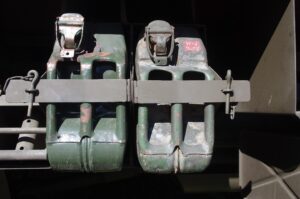As a farm owner, I have things that require gasoline, especially during summer. Since I understand how inflammable gas could leave you in a dangerous situation during explosion, I don’t store it carelessly.

Where should I store my gas in the summer? The best way I store my gas is to leave it in my old shed, which is well-ventilated and separated from the main house. In addition, I ensure that open flames, electrical equipment, and other ignition sources are far from the shed.
The shed has been protected from the heat of the summer sun and this keeps evaporation to a minimum. During summer, I ask family members to store gas cans at room temperature.
The gas cans must be far from flames or sparks. Furthermore, I ensure that my children and pets don’t go near the farm gas cans. Therefore, I always check containers once a month for potential leaks.
Why We Need Gas
We depend on gasoline for our everyday activities one way or the other. We use it to run our cars and trucks. We use it to take our children to school, and go shopping. We use it in our lawnmowers and other lawn care equipment to cut our grass and gardens to keep our environment clean and looking good.
Gasoline helps us go on vacations by powering our boats vehicles, and motorcycles. However, gasoline can become a problem if you do not handle or store it well. You should use gasoline only for the purpose it is meant for. It is meant to be a motor fuel.
You should not use it as a solvent, cleaner, barbecue starter, or for any other thing that does not have to do with the engine.
Use Approved Containers
Store gasoline in only approved containers and the containers must be properly sealed with a good label. There are usually different types of storage containers for homes and hardware stores. Do not store gasoline in glass containers.
Do not store it in any improvised receptacles. Ensure the container you use for storing the gasoline has a proper cover. Ensure the cover does not have a hole in it. It can attract fire.
You should not store more gasoline than you need for your next operation. The liquid decomposes fast, it loses its quality when it stays very long, like many weeks. For instance, if you store gasoline in the winter, by spring it will almost be worthless.
Gasoline and Home Generators
If you have a standby generator in anticipation of a power outage, do not store gasoline in its tank. There is a tendency that the gasoline will break down. If you have unused gasoline in your engine tank for a long time, it may cause problems in the engine.
It is better you store the gasoline away in a proper container, and use it when needed. In addition, do not store gasoline in your powerhouse. It can catch fire from the generator.
Precautions to Follow
- To know the government set rules and standards for gasoline storage, go to your local government or state government’s offices. For instance, the fire codes and regulations authority regulates the quantity of gas you can store in your home as an individual.
The normal quantity approved is 25 gallons. The law has it that you should store it in approved containers not more than 5 gallons each.
- You have to store gasoline in approved containers or tanks. Close the containers, and tanks well so that the gasoline will not spill.
- Store your gasoline a room temperature because it is a flammable liquid. Keep it away from the sun, a water heater, a space heater, or a furnace.
- Maintain a distance of at least 50 feet away from possible ignition sources like pilot lights. Gasoline vapors can go far on the floor to ignition sources because it is lighter than air. Avoid smoking where gasoline is handled or stored. It may ignite a fire.
- Do not refill an engine such as a lawnmower engine with gasoline when the engine and attachments are still hot.
- Do not store gasoline in the house where people are living like a shed or garage. Keep gasoline out of the reach of children at all times.
- Keep gasoline outdoors or in a place that has ventilation.
- Never mix gasoline with kerosene or diesel, no matter the quantity. Do not use it as fuel for kerosene heaters or lamps.
- Absorb every spill of gasoline with sawdust, paper, or rags. You should contain or collect bigger spills. Contact your local government or hazardous waste disposal center for a directive on how, and where to dispose of spilled gasoline.
- Do not dispose of spilled gasoline or the materials you used in cleaning it carelessly, into your garbage, drains, toilets or sewers. It can ignite a fire if you do. It can also seep into streams, bays, lakes, or your groundwater.
Do you use gas? During winter, the air calms the environment. As a result, you don’t have to worry much about explosion. However, summer comes with hotness that can affect the gas cans’ temperature.
If you don’t store them well, they may evaporate or explode, which is in no one’s advantage.
FAQs
Is it safe to store gasoline in a hot shed?
You can store gasoline at a temperature that is less than ideal only when you have taken proper precautions. A small ignition of fire can make it catch fire because it is flammable. It cannot combust by heat alone, but heat can make it explode. This means even under the right conditions the container can explode.
Can a gas explode if left in the sun?
Sunshine will increase the temperature, and that will, in turn, increase the pressure on the gas bottle. Bottles resist an increase in pressure, so it is not advisable to keep bottles in the sun.
Where should I store my gas in the summer?
During summer, you must store your gas cans in well-ventilated areas and away from other inflammable sources.

